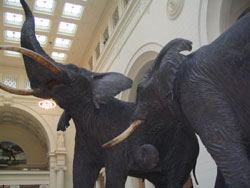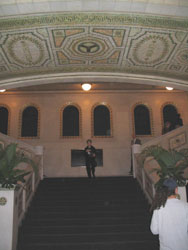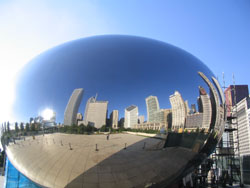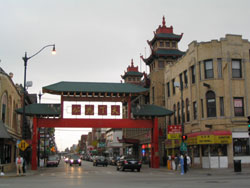Yesterday I got up early again and typed up my travel reports on the free computer at the Arlington House. Then my friend Linda and I made our way to one of our favourite Chicago hangouts for breakfast: the “Bourgeois Pig Cafe” is located close to the intersection of Fullerton and Halsted/Lincoln and is a 2 story cozy cafe with a small sitting area and patio downstairs, and a beautiful converted living room and balcony upstairs. I had one of my favourite breakfast indulgences: a deluxe Belgian waffle with strawberries, whipped cream, pecans and brown sugar, just a sinful treat on a hungry stomach. Linda had a huge and delicious looking foccaccia sandwich with ham and melted cheese and raved about it as well.

The Bourgeois Pig Cafe
Appropriately strengthened we started our explorations. We wanted to check out a Polish area called Wickertown and took the Fullerton bus west to Damen and south to North Street. We walked around a pleasant neighbourhood with lots of small stores, funky boutiques and chic little restaurants. The weather was really clammy and cold though, so we decided to continue our explorations indoors and head to a museum. On we hopped onto the el-train and headed downtown to the Chicago Cultural Center, the main informational contact point for tourists. One of the local volunteers recommended that we go to the Field Museum and see the Pompeii exhibit.
The Field Museum was originally incorporated in 1893 and was renamed the Field Museum of Natural History, to honour the Museum’s first benefactor, Marshall Field. In 1921 the Museum moved from its original location in Jackson Park to its present site on Chicago Park District property near downtown where it is part of a lakefront Museum Campus that includes the John G. Shedd Aquarium and the Adler Planetarium. These three institutions are regarded as among the finest of their kind in the world and together attract more visits annually than any comparable site in Chicago.

Entrance to the Field Museum
The Field Museum is currently hosting a special exhibition: “Pompeii – Stories from an Eruption” and we decided to visit this special exhibition. The Pompeii exhibit features jewellery, earthenware, small tools, everyday objects, even a bathtub that were excavated from Herculaneum and Pompeii. Room-size frescoes and mosaics bring to life the artistic talent of these ancient Roman towns. A little eerie were the plaster casts of victims that had been buried in volcanic ash and when the bodies disintegrated, they left behind a cavity in the ash that was filled with plaster, providing a perfect cast of the victim. We saw plaster casts of a young girl, a young man, two women huddled against each other, even a little dog with its feet up in the air. The plaster casts really gave you an idea of the instantaneous nature of this catastrophe.
Informational videos and a 3-D animated feature provided a visual representation of some of the Roman villas and public areas, giving us a good example of what Pompeii and Herculaneum must have looked like before the volcanic eruption. The exhibition really showed what a catastrophic event this volcanic eruption must have been and how people were caught completely off-guard, unable to flee. In essence, most of the victims choked almost instantly on the burning clouds of pyroclastic ash that rained down on them as they were trying to escape or hiding away in the cascades by the sea.

Main Hall of the Field Museum
The show also demonstrated that today the area around Vesuvius is extremely densely populated and a timeline indicated that the amount of volcanic activity has noticeably increased over the last 300 years. Today the area around Naples is one of the most closely monitored areas on the planet where the African Plate is subducting under the Eurasian Plate. More seismic and volcanic activity is definitely in store for this geologically unstable region.
After our visit to the Field Museum we walked across Grant Park to Michigan Avenue since we needed to have one more tasty lunch before we had to grab our luggage and start our respective journeys home. We took the bus up Michigan Avenue, and as we unfolded our CTA transit map to figure out what combination of buses we had to take, the couple behind us and a young lady in front of us volunteered their help in navigating us around their city. With their input we chose the most appropriate route and we both noted that we were surprised at this unsolicited but most welcome gesture of assistance.
 |
 |
| Entrance to Grant Park, walking northwest from the Field Museum | Chicago Vista east of Michigan Avenue |
Once back in the Lincoln Park Area, we headed back to our favourite place, the “Austrian Bakery” on Clark north of Fullerton, which offers delicious samples of the type of food that both Linda and I grew up with, dishes that are usually hard to come by in North America. We both enjoyed a typical Austrian dish: “Fritattensuppe”, a clear beef broth with pancake strips, and I had a Wiener Schnitzel with home-fried potatoes. It doesn’t get much more Austrian than that and we both purchased a few baked goods before we headed off. Linda took the train back to her town in Indiana, while I made my way through the rain to O’Hare Airport where I was randomly selected for a thorough frisking, and just a couple of hours later I touched down safely on home turf in Toronto.
As always, Chicago has been a beautiful getaway and we both had a phenomenal time. Even the cool and clammy weather wasn’t able to stop us….



